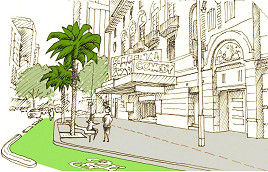Sweet Country
By Chris Mineral
The amber light on the switchboard lit up.
Late cold night, a desert wind. At the station, the radio announcer picked up the phone. Brief introductions, and then the request – to play Johnny Cash singing Peace In The Valley ...
There are a trifecta of songs of note from the superb Warwick Thornton film Sweet Country. The curiousity is that there is no musical sound track for this western set in Central Australia late in the third decade of the 20th century.
The first song is when the moral compass of the film, Fred Smith played by Sam Neill, sings a song called Jesus Loves Me, unaccompanied and unvarnished.
His delivery of the song has the cadence of an earnest preacher, his passion and conviction superior to his musical talents, perhaps.
His audience is the chasing posse gathered together by Sgt Fletcher (played by Bryan Brown) to track down Sam Kelly (Hamilton Morris) and his wife.
The couple are on the run after an effective act of self-defence against a land owner.
Upon completion of his serious rendition of Jesus Loves Me, with the title repeated many times, without any New Orleans pizzazz, Fred Smith announces the title of the song.
The heathen hounds surrounding the fire are unimpressed, most grunt and return to the solemnity of staring at the fire. Sam Neill, the actor, was in Central Australia in a previous film, Until The End Of The World (1991) directed by the German director Wim Wenders.
Wenders of course once documented a couple of phenomenal Antipodean bands in his film Wings Of Desire. The Australian Music Vault can be of assistance for intrepid musicologists ...
No equation
To explain the division of the senses
No sound to reflect
The radiance of time
In the beginningest dream
Halls of disorder
Where we are swept to encircle dawn
It Takes Time - Patti Smith
The second song to note from Sweet Country is when, by chance, the fugitive couple, with the posse closing in, are above a canyon, and they can hear a tribe singing a ceremonial song, clapping, and playing clapsticks, with a brilliant precision of tens of thousands of years of performance.
Not myth, though they are singing myths, but fact. You can sense the respect that Sam Kelly has for this tribe, this moment. Their situation is reminiscent of characters in the novel Blood Meridian by Cormac McCarthy. I was reminded at this moment of the photographer Kristian Laemmle-Ruff and his exhibition Mind The Gap.
The third song arrives as the credits roll, and it is Peace In The Valley, a Thomas Dorsey song from 1937, being performed by Johnny Cash and recorded live at San Quentin Prison on February 24, 1969.
June Carter Cash chimes in on vocals, alongside the Carter family who provide autoharp, vocals and acoustic guitar.
Cash sounds compelling and biblical with his baritone voice providing a superb ballast to the shape of the final moments of this great film.
It is a thunderous exclamation point to a brilliant western. With no soundtrack music, this film is all about the natural sounds of the environment, the sound of horses braying and their hooves, boots walking on timber and red soil.
In a virtuoso performance in the trial scene, Matt Day presides over matters as the judge. In the background, on the main street of town, on a windy day, a corrugated iron door can be heard and seen banging back and forth on a hinge. Very Sergio Leone-esque. Fine cinema by Thornton.
In contrast to this lack of musical soundtrack, in his art installation work Mother Courage in 2012 at the ACMI Gallery 2, Warwick Thornton had a couple of screens set up inside a well travelled Kombi Van with a continuous soundtrack of music, with an announcer speaking between songs.
The songs in Mother Courage included: Black Boy by Wedgetail Eagles; Tjama Tjama by Ilkari Mara; Patrola - The Petrol Sniffing Song by Punch Thompson; and Make More Spear by Frank Yamma. On the screens we could see a matriarch painting vibrant dot paintings, with a young boy nearby, listening to the radio.
Omega and Alpha
The fauna ought to equal the flora
But priest equals aura
And beginning equals the end
The end always equals the start
Aura - Steve Kilbey
When Sgt Fletcher, a returned soldier, continues alone on his penultimate odyssey trailing behind the fugitives, his chiselled, gaunt, grim, angular features are a signature echo/harmonic of the Albert Tucker painting The Explorer.
The long shot on the salt pan with Sgt Fletcher collapsed on the ground next to his horse standing in profile is sublime. In the end, Sam Kelly’s journey matches that of Weisreidau in Guy Sajer’s The Forgotten Soldier.
Thornton’s short film Green Bush (2005) is based on his experience as a radio announcer at CAAMA (Central Australian Aboriginal Media Association) radio in Alice Springs.
Sweet Country is set in Central Australia in the MacDonnell Ranges, country that is within reach of the CAAMA Radio transmitter.
There is magnetic resonance to the work of Warwick Thornton.
Enceladus Turntable
Adalita - Hot Air
Alain Bashung - Volutes
Courtney Barnett and Kurt Vile - Over Everything
Gigs/Shows
Sunday arvos in March – Sunday Arvo Cherry Blues Sessions at Cherry Bar, ACDC Lane;
Wednesdays 4pm – Out On The Patio, 3RRR
Thursday, March 8 - Mogwai, Forum Theatre;
Saturday, March 10 - BOHEMIA, Musicians and Mentors, ANAM;
Saturday, March 10 - JAALA, Rooftop Cinema. Level 7, Curtin House; and
Friday, March 23 - Mia Dyson, The Gasometer Hotel.

Council endorses office tower at Flinders Lane despite querying car park demolition






 Download the Latest Edition
Download the Latest Edition